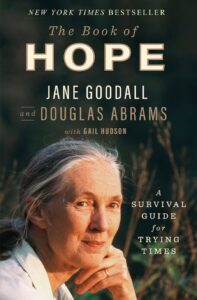This post originally aired as a commentary on Tri States Public Radio. To listen, go here.
 Author E.B. White once said, “I get up every morning determined to both change the world and have one hell of a good time. Sometimes this makes planning my day difficult.”
Author E.B. White once said, “I get up every morning determined to both change the world and have one hell of a good time. Sometimes this makes planning my day difficult.”For me, planning my day is never the problem. I get up every morning determined to change the world – but only after I’ve had my coffee and listened to the news.
For the past two weeks, the top story has been Russia’s looming threat to invade the Ukraine, adding “the possibility of World War III” to the mountain of anxieties I already have. With the pandemic, the climate crisis, gun violence, greed, racism, and more, it’s a Mount Everest of despair. It feels so impossible to change anything, let alone have any influence at all, that I swing the opposite direction, figuring if we’re all gonna die, I might as well have “one hell of a good time.” And so, I help myself to the second slice of chocolate pie. I take the spontaneous trip to Cancun. I buy the $25 bottle of Cabernet instead of the $6 one and drink a glass too many. But all that’s done is pack on nine extra pounds and deplete my bank account.
Indulgence is not the answer.
I know I’m not alone in this feeling of futility to change the world. But I also know there are optimists among us who can inspire us to keep trying. Jane Goodall is one of them.
After hearing about her latest book, “The Book of Hope: A Survival Guide for Trying Times,” I ran out to buy it. Given that Jane Goodall is a naturalist, I was surprised to find it in the self-help section of the bookstore. But help is what I needed to ward off heart palpitations and further weight gain.
The book is coauthored by Douglas Abrams, who, in a series of interviews with Jane, presses the 87-year-old to answer the question: How can you still be hopeful when everything seems so dire?
She lists four reasons:
• the amazing human intellect
• the resilience of nature
• the power of young people
• the indomitable human spirit
We may have created the problems, but she believes with our intellect, we are smart enough to solve them. And that with our instinct for survival, our human spirit will drive us to not give up, even when there’s a chance we won’t succeed. Jane acknowledges that things are indeed dire, but she insists we can turn things around if we get together and act now. Every small action helps. Each of us must do our bit.
“Hope is contagious,” she says. “Your actions inspire others.”
This snowball effect makes sense, but where do we start? “It’s in nature where we can find the answers and the hope,” she explains.
The only time Jane has lost hope was when her husband died, but turning to nature helped restore it, claiming, “It was the forest that helped me most of all.” The natural world is also where she feels most connected with a Great Spiritual Power. She says it’s that power that gives her the courage and strength to keep going, to keep sharing her message and continue fighting for justice, environmental and otherwise.
I was surprised to learn that the grief we feel over climate crisis has a name – eco-grief. Jane suggests that our survival depends on confronting that grief and getting over our feelings of helplessness and hopelessness. We can find healing in nature, she reminds us, as well as wisdom, cautioning that when we lose the connection with the natural world, we lose our wisdom.
“The Book of Hope” is packed with many more of Jane’s insights and is absolutely worth reading. Equally inspiring, listen to Jane’s interview, titled “What it Means to Be Human,” on Krista Tippett’s “On Being” podcast.
This past weekend, I channeled my inner Jane Goodall, and went for a hike with three girlfriends. While walking through the forest and fields, we determined that in addition to picking up empty beer cans and other litter, which we do on all our hikes, we could plant more trees to replace the ones a local farmer recently cut down. These are the small but impactful actions we can take that add up to bigger change.
Energized by the sun, the wind in our faces, and the beauty of the landscape, we walked four miles, talking and laughing the whole way. Between the camaraderie of friends and the immersion in nature, our spirits were restored. And as a bonus, the exercise was a step toward dropping those extra nine pounds. In the words of E.B. White, our hike was “a hell of a good time.” And, best of all, it left me feeling hopeful.